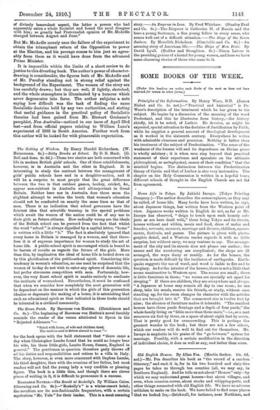Home Life in Tokyo. By Jukichi Inouye. (Tokyo Printing Company.)—The
author describes the commonplaces, as they may be called, of home life. Many books have been written, he says, about Japanese things, but written from the Western point of view. Japanese works written in English do not, as far as Mr. Inouye has observed, " deign to touch upon such homely sub- jects as are here dealt with," these being Tokyo and its streets, houses without and within, meals and food, dress of males and females, servants, manners, marriage and divorce, children, amuse- ments, festivals, and games. The picture is given with photo- graphic detail, and a Western reader regards it with no little surprise, but without envy, we may venture to say. The arrange- ment of the city and its streets does not please our author ; the names and the numbering are complicated ; the shops are ill arranged, the ways dusty or muddy. As for the houses, the question is made difficult by the incidence of earthquake. Earth- quake suggests the use of wood, and wood is liable to fire and to burglary. As for the interior of the houses, there is not a little that seems unattractive to Western eyes. The rooms are small ; there is little furniture in them ; " no rooms are specially set apart for sleeping." If there are children, they are everywhere and always. "A Japanese at home may remain all day in one room ; he can sleep, take his meals, receive his friends, or study, without once standing up, for the room changes its character with the articles that are brought into it." The commonest size is twelve feet by nine ; the absence of furniture makes it tolerable. "The smallest houses have three yards frontage and a depth of four yards," the whole family living on "little more than three mats,"—i.e., as a mat measures six feet by three, on a space of about eight feet by seven. That is pretty good for overcrowding. This is perhaps the greatest wonder in the book; but there are not a few others, which our readers will do well to find out for themselves. Mr. Inouye is emphatic in his praise of the "go-between" system for marriage. Possibly, with a certain modification in the direction of individual choice, it does as well as any, and better than some.






































 Previous page
Previous page